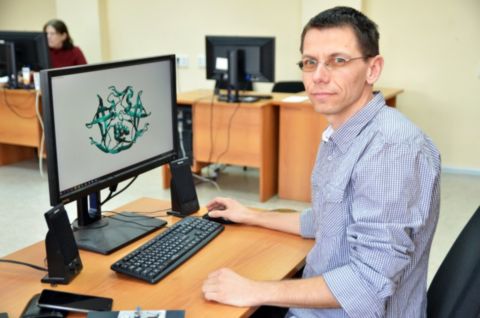Continuing the project on searching for effective drugs, South Ural State University (SUSU) scientists have conducted research for finding new potential inhibitors active against SARS-CoV-2 3CLpro. The work has been based on the QSAR predictive model and data from the list of approved drugs. Results of the research have been published in the highly rated journal Molecular Diversity (Q2).
There is still no sustainable drug against coronavirus despite 2 years of active research. Scientists all over the world work on this problem, some of them are in the process of finding new medicine, others, as specialists from South Ural State University, prove the effectiveness of already known cures that were made to affect other diseases.
In the last research, scientists have introduced the QSAR model capable of predicting activity against SARS-CoV-2 3CLpro. It is a main protease found in coronaviruses that is known as a target for therapy. Using a newly developed predictive model SUSU scientists have predicted the most effective inhibitors from the list of FDA approved and experimental drugs. Among antiviral agents, lopinavir, idoxuridine, paritaprevir, and favipiravir have showed the highest inhibition potential. The findings were corroborated by molecular docking simulations between drugs and protease.
“We’ve investigated how drugs affect 3CLpro. To do this, we have applied a radial basis function approach developed in our Computer-Aided Drug Design Laboratory. The main conclusion is that drugs bound in the active pocket of the protease influence only on the protease' residues in the near vicinity. This is important for drug design, because it is crucial to know the flexibility of the protein, of the potential drug and the interaction pattern between them. Then, we’ve downloaded from the ChEMBL database all compounds that have been tested as potential inhibitors of protease to build powerful highly accurate and robust QSAR model capable to predict bioactivity against 3CLpro for any compound,” says Doctor Jurica Novak.
.jpg)
As a result, there has been introduced a new method for structural similarity analysis, that has shown that perturbations introduced by ligands binding are local in nature. In the process known as ‘drug repurposing’, a list of compounds has been identified as potent 3CLpro inhibitors among more than 6000 approved and investigational medicines. For example, baricitinib is firstly approved for treating moderate to severe rheumatoid arthritis, now it is recommended for patients with severe or critical COVID-19. The clinical trials of all drugs can proceed only after in vitro and in vivo experiments.
Now scientists are exploring the potential SARS-CoV-2 main protease inhibitors from the Withania somnifera plant. They plan to compare effectiveness of these inhibitors on the original Wuhan and the omicron variants and how the mutations in the primary structure are reflected on the binding affinity.
The research has been conducted within a BRICS Grant received on searching for effective drugs.
South Ural State University is a university of digital transformations, where innovative research is carried out in most priority areas of science and technology development. Following the strategy of scientific and technological development of the Russian Federation, the university focuses on the development of large scientific interdisciplinary projects in the field of the digital industry, materials science, and ecology. In 2021, SUSU won the competition under the Priority 2030 program. The university performs the functions of the regional project office of the Ural Interregional Scientific and Educational Center of the world level.




